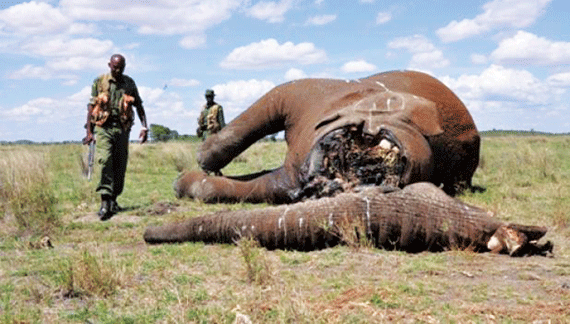
HUNGER and neglect by the government has driven villagers from Tsholotsho’s Phelandaba area to poison elephants after being manipulated by criminals who deal in ivory from urban areas.
Richard Muponde Senior Reporter
Phelandaba, located about 100km from Tsholotsho business centre has hogged the limelight following the death of more than 100 elephants through poisoning of watering holes in the Hwange National Park.
Four villagers were recently jailed for between 15 years and 16 years for poisoning elephants and illegal possession of elephant tusks.
Thabani Zondo (24), Robert Maphosa (42) and Dedani Tshuma (25) and Ackim Masuku were convicted on their own pleas of guilty to contravening the Environment Management Act and illegal possession of ivory.
Zondo and Maphosa were jailed for an effective 15 years in prison with labour and ordered to restitute $600 000 to the Parks and Wildlife Management Authority of Zimbabwe (Zimparks) by December 31.
Tshuma was sentenced to an effective 16 years with labour and is also supposed to restitute $200 000 by the same date. Masuku was jailed for 15 years.
However, villagers said circumstances forced most people to resort to criminality as they have to provide food for their families amid abject poverty that engulfs the entire district.
- Chamisa under fire over US$120K donation
- Mavhunga puts DeMbare into Chibuku quarterfinals
- Pension funds bet on Cabora Bassa oilfields
- Councils defy govt fire tender directive
Keep Reading
Southern Eye visited Phelandaba on Thursday to get the real story why villagers resorted to poaching elephants for survival.
Villagers said they were living in poverty and hunger stalked them as they had not harvested anything for the past five years because of erratic rains and elephants which destroyed their crops while authorities did nothing to help them.
The government is mostly to blame for the neglect of these people as it has never provided food assistance to starving villagers leaving them at the mercy of criminals who brought in cyanide to poison elephants for kickbacks ranging from between $100 to $500, the villagers charged.
The villagers could not resist the temptation because they wanted money to buy food.
“We are starving here. For the past five years we have not harvested anything from our fields because of erratic rains and our crops being destroyed by elephants,” headman Owen Dladla from Vukuzenzele Village in whose jurisdiction the jailed reside, said.
“Since 2010 elephants have been a problem to us. We have been reporting to Zimparks rangers about the elephant menace, but we received no joy. No one came to our rescue.”
He said criminals then took advantage of the villagers’ plight and brought in cyanide to poison the elephants and get ivory for a fee.
“Because of that, cyanide found its way into the area and our people were so receptive because they had no one to cry to or help them since everyone seemed to shy away from them.
“They then took things into their own hands hence this catastrophe,” Dladla said.
“The government on the other hand was not helping villagers with food aid. Villagers had to rely on buying mealie-meal from Bulawayo.
“However, you should understand that most of these people here are unemployed so to get money they had to engage in these criminal activities.
“Our people are not criminals but are taken advantage of because of their circumstances.”
Another villager who spoke on condition of anonymity said the collapse of Campfire in the area also contributed to the problem.
“Campfire money was not being remitted to the people as before. So people were left with no option but to kill the elephants,” he said.
“In this area we don’t have any self help projects like other areas which have dams and rivers and embark on irrigation.
“Phelandaba has nothing of that sort, no river or dams. The only thing we have is the wildlife.”
Nkosana Dladla the headman’s younger brother urged the government to look into their plight and provide food urgently so that villagers desist from killing elephants and other wild animals.
“People need food as a matter of urgency so that we could curb this vice of killing wild animals,” he said.










